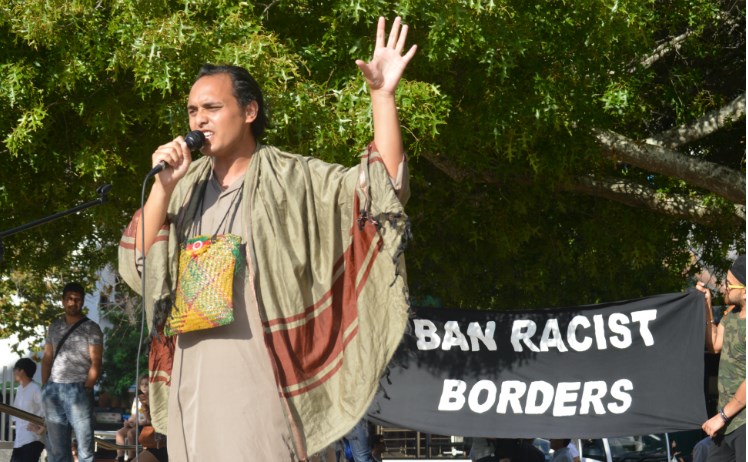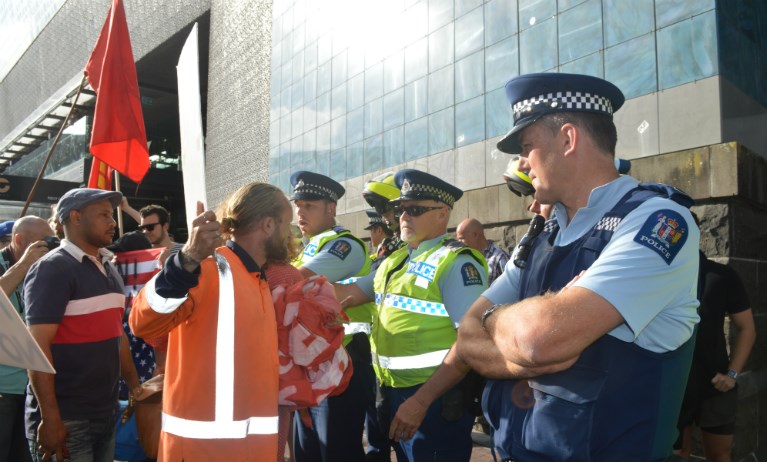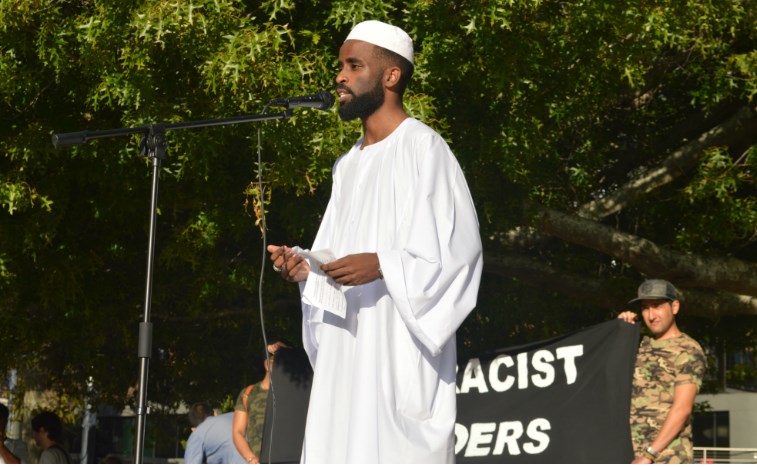More than 1,500 Kiwis rallied at Aotea Centre at 6 p.m. on February 7 expressing their solidarity against the recent Muslim travel ban in the United States. People from all cultural and religious background stood strong protesting US President Donald Trump’s Islamophobic immigration policy.
The protest ‘No Ban No Wall’ organised by university students on ‘Aotearoa Against Muslim Ban’ Facebook page gained momentum rapidly and became a hot topic of discussion online as thousands signed up for the mass gathering.
On January 27, President Trump signed an executive order titled ‘Protecting The Nation From Foreign Terrorist Entry To The United States’, which prohibits travellers, except US citizens, travelling on passports from Iran, Sudan, Syria, Somalia, Iraq, Libya, and Yemen to enter the US for a period of 90 days. There is also a 120-day ban on all refugees and an indefinite ban on Syrian refugees.

Inevitably, following Mr Trump's order, protests erupted across the US, especially outside airports and in other places such as London and Canada, to overturn the ban on Muslims and refugees and to release those detained.
Different community organisations such as Pacific Panther Network, Islamic Women’s Council of New Zealand, Racial Equity Aotearoa, Shakti Youth Ambassador Network, Syrian Solidarity New Zealand, Migrant from Mexico, and Church in Progress MCC came forward to support and contribute to the protest at Aotea Centre.
"We are really glad to see [the] immense support from the Jewish community here. Their presence amongst us shows that we are not alone," a protester at Aotea Centre said.
Globally, there is an increase in Islamophobia that marginalises and advocates violence against Muslim communities. Singling out Muslims and people from specific Muslim-majority countries is a scary step towards fascism,” Fahad Hussain, a university student and one of the organisers of the protest, said.
The gathering held placards that read ‘Jews against Islamophobia’, ‘#Resist’, ‘Shelter more Refugees, Punch more Nazis’, ‘Your Silence equals more Violence’, ‘Stand against Islamophobia’, and Maori saying ‘Aha Te Mea Nui O Te Ao’ and ‘He Tangata’ that means ‘What is the most important thing in the world?’ and ‘It is the people’.
“These border policies are racist, Islamophobic, and unacceptable. They continue a pattern of white supremacist immigration exclusion in colonial settler countries [such as] the United States. Bill English refusing to call it for what it is—racist—is a dangerously weak response and doesn’t represent the people of Aotearoa” Mehwish, one of the organisers of the protest said.
The police formed a human barricade blocking a small group of Mr Trump supporters from interacting with the protesters at the gathering. While a Trump supporter jeered anti-immigration slogans and mocked the crowd, a female protester almost got into an argument with a protester before the police intervened.

“I find the travel ban too silly, and it is time for the people of New Zealand to stand up and say we do not support this. We welcome people from everywhere, and we want diversity, and it is our strength,” Rosemary Penwarden, a Kiwi protester at the event, said.
“We should not see the executive orders in isolation. Deportations and Immigration restrictions have been in place for years. Rather than seeing Trump as an exception to the rule, we need to question the political and systematic racism that treats minorities, people of colour and immigrants as the 'dangerous others,'” Nisha, another organiser of the rally, said.

Farida Sultana, a Muslim feminist; Fatumata Bah, a university student and a former refugee; TeRata Hikairo, a Maori Muslim, educator and community advocate; Ahmed Bashir, a Sudanese-Kiwi and a student of international relations and a former refugee were among the many who addressed the crowd and raised voice against the travel ban.
About 60,000 travellers were affected by the ban and had their visas cancelled.
On February 5, James Robart, a US Federal Judge in Seattle, put a temporary suspension on Mr Trump’s executive order, as the order was causing “immediate and irreparable injury” and may be ruled unconstitutional, the media reported. The ruling meant that officials had to stop enforcing the travel ban and the banned travellers could enter the country.
However, protesters are not looking at a merely temporary suspension.
“The immigration ban is ‘temporarily’ lifted, and this does not mean an end to fascism, racism, and centuries of oppression and dehumanisation of people of colour and indigenous nations,” Aotearoa Against Muslim Ban said on their Facebook page.